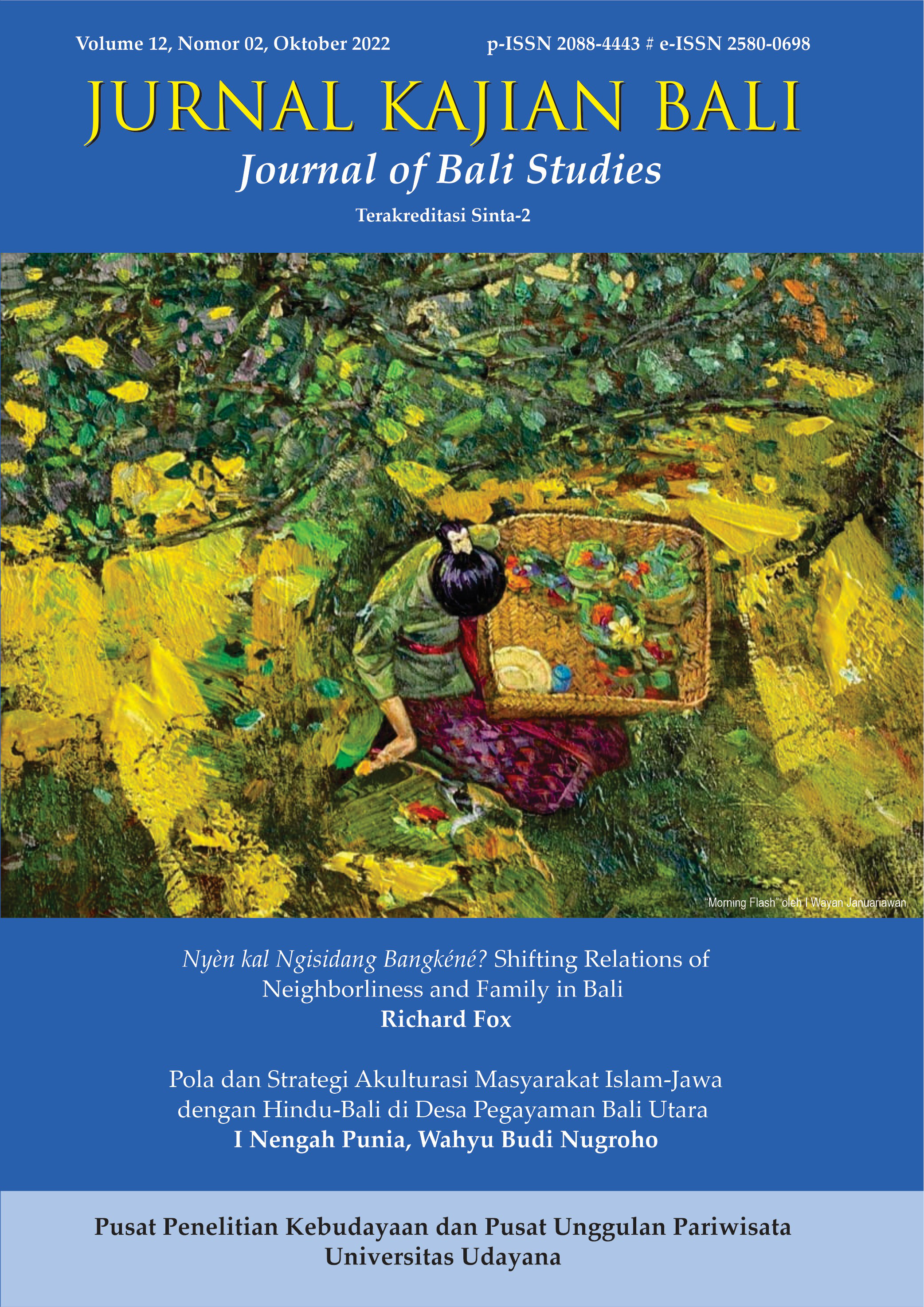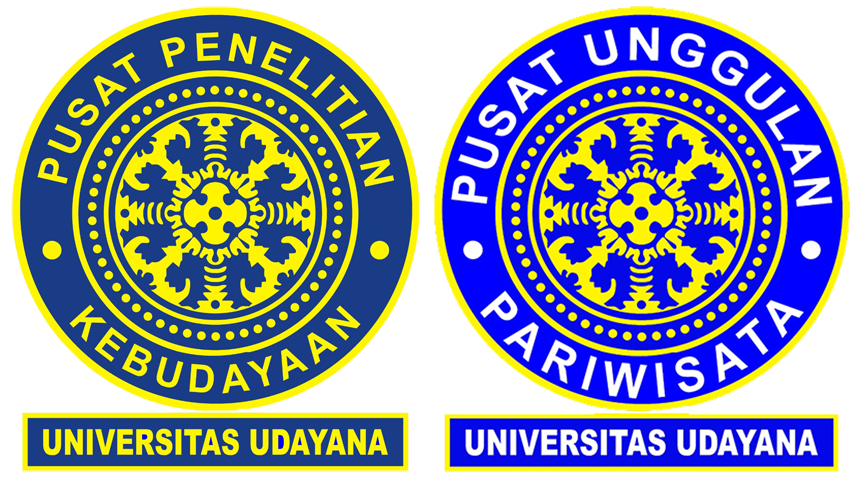Cultural Studies and Everyday Life: A Balinese Case
Abstract
This article aims to bring the intellectual rigour of Cultural Studies to Balinese ideas about culture which confuse culture with ideology. Cultural Studies is not the study of culture, but its critique which deconstructs culture as misrepresenting actuality as an Imaginary convenient to regimes of power. The New Order articulated ‘kebudayaan’ to create a submissive populace happy to embrace global tourism. Culture is no longer how how people do things but marketable commodities posturing as ‘ancient tradition’. Bali as paradise is a cliché. The island now fulfils Madame Suharto’s dream of Disneyland. The capitalist fantasy of endless cost-free growth bears no resemblance to the sophisticated Balinese cosmology of Kali-Yuga, which ends in cataclysmic dissolution; or to popular ideas of the world as ceaseless transforming. Although kebudayaan dismisses ordinary people as stupid masses, they often escape the ideological straitjacket of kebudayaan by just getting on with culture as everyday life.
Downloads
References
Ang, I. (1991). Desperately seeking the audience. London: Routledge.
Bacon, F. 2007 [1620]. The New Organon or: true directions concerning the interpretation of nature. trans. J. Bennet, E-Bookarama editions.
Bagus, I.G.N. n.d. Kajian Budaya Universitas Udayana dan Paradigma yang Dikembangkan. Unpublished paper 2001.
Bali Post (2004). Ajeg Bali: sebuah cita-cita. Denpasar: Bali Post.
Barthes, R. (1973). Myth today. In Mythologies. London: Paladin.
Baudrillard, J. (1983a). Simulations. New York: Semiotext(e).
Baudrillard, J. (1983b). In the shadow of the silent majorities...or the end of the social and other essays. New York: Semiotext(e).
Baudrillard, J. (2015). Between difference and singularity. In Jean Baudrillard: from hyperreality to disappearance. eds. R.G. Smith & D.B. Clarke, Edinburgh: Univ. Press.
Buchanan, I. (2015). Assemblage theory and its discontents. Deleuze studies 9, 3: 382-92.
Budianta, M. (2000). Discourse of cultural identity in Indonesia during the 1997-1998 monetary crisis. Inter-Asia cultural studies, 1.1: 109-128.
Butler, R.W. (1980). The concept of a tourist area cycle of evolution: implications for management of resources. Canadian geographer 24, 1: 5-12.
Chowdhry, A.S. (2013). Representations of consumerism, sexuality and crime as objects of fear for the Indian middle class by the Indian English-language media: a study of practices and commentary. PhD thesis in the University of London.
Clifford, J. (1988). On ethnographic authority. In The predicament of culture: twentieth-century ethnography, literature, and art. London: Harvard Univ. Press.
Collingwood, R.G. (1940). An essay on metaphysics. Oxford: Clarendon Press.
Couldry, N. (2010). Theorising media as practice. In Theorising media and practice. eds. B. Bräuchler & J. Postill, Oxford: Berghahn.
Couldry, N. & Hobart, M. (2010). Media as practice: a brief exchange. In Theorising media and practice. eds. B. Bräuchler & J. Postill, Oxford: Berghahn.
de Certeau, M. (1984). The practice of everyday life. London: Univ. of California Press.
Deleuze, G. (1987). Dialogues. New York: Columbia Univ. Press.
—& Guattari, F. (1988). A thousand plateaus: capitalism and schizophrenia. London: Athlone.
Donoghue, D. 1981. Ferocious alphabets. London: Faber.
Fabian, J. (1991). Culture, time and the object of anthropology. In Time and the work of anthropology. New York: Harwood.
Fiske, J. (1987). Television culture. London: Methuen.
Fong, S.Y. (2016). The cultural articulation of fear in Singapore: an ethnography of television production practices. PhD in the University of London.
Foucault, M. (1981). The order of discourse. In Untying the text: a post-structuralist reader. ed. R. Young, London: Routledge & Kegan Paul.
Foucault, M. (1986). Of other spaces: utopias and heterotopias. trans. J. Miskowiec, Diacritics, 16: 22-27; Des espaces autres. Architecture /Mouvement/ Continuité 5: 46-49, delivered March 1964; published 1967.
Fox, R. (2011). Critical reflections on religion and media in contemporary Bali. Leiden: Brill.
Galbraith, J.K. 1971. Economics, Peace and Laughter. Boston, MA: Houghton Mifflin.
Geertz, H. (1994). Images of power: Balinese paintings made for Gregory Bateson and Margaret Mead. Honolulu: Univ. of Hawai’i Press.
Gramsci, A. (1971). The intellectuals. In Selections from the prison notebooks of Antonio Gramsci. London: Lawrence & Wishart.
Grossberg, L. (1996). History, politics and postmodernism: Stuart Hall and cultural studies. In Stuart Hall: critical dialogues in cultural studies. London: Routledge.
Guénon, R. (1942). The crisis of the modern world. London: Luzac & Co.
Hall, S. (1980). Encoding/decoding. In Culture, media, language: working papers in cultural studies, 1972-79. London: Unwin Hyman.
Hall, S. (1996). Cultural studies and its theoretical legacies. In Stuart Hall: critical dialogues in cultural studies. eds. D. Morley & K-H. Chen, London: Routledge.
Hartley, J. (1996). Popular reality: journalism, modernity, popular culture. London: Arnold.
Hobart, M. (2000). Introduction. After culture. anthropology as radical metaphysical critique. Yogyakarta: Duta Wacana Press (Online at: https://www.academia.edu/26946573/After_culture_anthropology_as_radical_metaphysical_critique).
Hobart, M. (2010a). What do we mean by ‘media practices’? In Theorising media and practice. eds. B. Bräuchler & J. Postill, Oxford: Berghahn.
Hobart, M. (2010b). Rich kids can’t cry: reflections on the viewing subject in Bali. About Performance 10: 199-222.
Hobsbawm, E.J. (1983). Introduction: inventing traditions. In The invention of tradition. Cambridge: Univ. Press.
Hon, T-K. (2019). Chinese philosophy of change (Yijing). Stanford encyclopedia of philosophy. https://plato.stanford.edu/entries/chinese-change/, Accessed 15 October 2021.
Jones, C.G. (2019). The delusion and danger of infinite economic growth. The new republic. https://newrepublic.com/article/155214/delusion-danger-infinite-economic-growth.
Koster, W. (2019). Pidato Gubernor Bali, Wayan Koster, Penutupan Pesta Kesenian Bali. Accessed 18th. April 2022: https://www.youtube.com/watch?v=jQkPWTp4sxY.
Koster, W. 2021. Pidato Gubernor Bali, Wayan Koster, Pembukaan Pesta Kesenian Bali XLIII 12th. June 2021. Accessed 18th. April 2022: https://www.youtube.com/watch?v=UYQlGb6ezog.
Kwek, I.E.T. (2010). Producing television, re-visioning Singapore Malays: an ethnography in television production practices. PhD thesis in the University of London.
Laclau, E. 1990. The impossibility of society. In New reflections on the revolution of our time. London: Verso.
Lanus. S. (2014). Puja Tri Sandhyā: Indian mantras recomposed and standardized in Bali. The journal of Hindu studies 7:243-272.
Larson, G.J. (1979). Classical Sāṃkhya: an interpretation of its history and meaning. 2nd. revised edn. Santa Barbara: Ross Erikson.
Larson, G.J. (1987). Introduction to the philosophy of Sāṃkhya. In Sāṃkhya: a dualist tradition in Indian philosophy. Princeton, N.J.: Univ. Press.
Lefebvre, H. (1991). Critique of everyday life: introduction. Vol 1, London: Verso.
Lovric, B.J.A. (1987). Rhetoric and reality: the hidden nightmare. Myth and magic as representations and reverberations of morbid realities. PhD. thesis in the University of Sydney.
Lyotard, J-F. (1984). The post-modern condition: a report on knowledge. Manchester: Univ. Press.
MacRae, G. (2010). If Indonesia is too hard to understand, let’s start with Bali. Journal of Indonesian social sciences and humanities 3: 11-36.
Marshall, A. (2011). Holidays in hell: Bali's ongoing woes. Time magazine, 9 April.
Morley, D. & Chen, K-H. (1996). Introduction. Stuart Hall: critical dialogues in cultural studies. London: Routledge.
Nietzsche, F.W. (1992). Friedrich Nietzsche: on the problem of translation. In Theories of translation, eds. R. Schulte & J. Biguenet, London: Univ. of Chicago Press.
Pemberton, J. (1994). Recollections from ‘Beautiful Indonesia’: somewhere beyond the postmodern. Public culture 13: 241-262.
Picard, M. (1996). Bali: cultural tourism and touristic culture. trans. D. Darling, Singapore: Archipelago Press.
Teeuw, A., et al. (1969). Śiwarātrikalpa of Mpu Tanakuṅ. The Hague: Nijhoff.
Thoburn, N. (2002). Difference in Marx: the lumpenproletariat and the proletarian unnameable. Economy and society 31, 3: 434-460.
Tylor, E.B. (1871). Primitive culture: research into the development of mythology, philosophy, religion, art and custom. London: John Murray.
UNESCO (2011). Cultural landscape of Bali Province (Indonesia) No 1194rev. Accessed online 28 January 2018.
Williams, R. (1983). Keywords: a vocabulary of culture and society. Revised edn., Oxford: Univ. Press.
Williams, R. (1989). Culture is ordinary. In Resources of hope: culture, democracy, socialism. London: Verso.
Winch, P. (1958). The idea of a social science and its relation to philosophy. London: Routledge & Kegan Paul.

This work is licensed under a Creative Commons Attribution 4.0 International License.



















